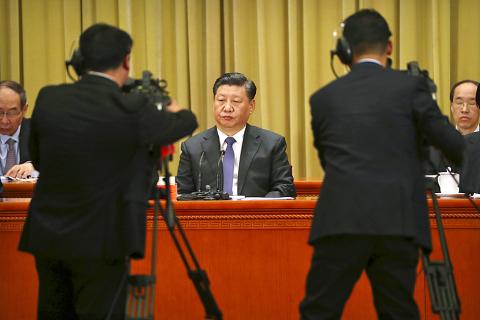China’s armed forces must boost their sense of urgency and do everything they can to prepare for battle, Chinese President Xi Jinping (習近平) told a meeting of top brass on Friday.
China is keen to bolster its armed forces amid territorial disputes in the South China Sea and escalating tensions with the US over issues ranging from trade to the status of Taiwan.
Xinhua news agency said Xi told a meeting of the top military authority that China faced increasing risks and challenges, and the armed forces must work to secure its security and development needs.

Photo: AP
Xi, who is also chairman of the Chinese Central Military Commission, said the armed forces must devise strategies for the new era and take on responsibilities for preparing for and waging war.
“The world is facing a period of major changes never seen in a century and China is still in an important period of strategic opportunity for development,” he was quoted as saying.
The armed forces needed to be able to respond quickly to emergencies, needed to upgrade their joint operations capabilities and nurture new types of forces, Xi said.
Xi’s comments followed his remarks on Wednesday that China still reserved the right to use force to achieve unification with Taiwan and prevent the nation’s independence.
Xi’s Taiwan speech came just days after US President Donald Trump signed the Asia Reassurance Initiative Act into law, reaffirming the US’ commitment to Taiwan’s security.

MAKING WAVES: China’s maritime militia could become a nontraditional threat in war, clogging up shipping lanes to prevent US or Japanese intervention, a report said About 1,900 Chinese ships flying flags of convenience and fishing vessels that participated in China’s military exercises around Taiwan last month and in January have been listed for monitoring, Coast Guard Administration (CGA) Deputy Director-General Hsieh Ching-chin (謝慶欽) said yesterday. Following amendments to the Commercial Port Act (商港法) and the Law of Ships (船舶法) last month, the CGA can designate possible berthing areas or deny ports of call for vessels suspected of loitering around areas where undersea cables can be accessed, Oceans Affairs Council Minister Kuan Bi-ling (管碧玲) said. The list of suspected ships, originally 300, had risen to about 1,900 as

DAREDEVIL: Honnold said it had always been a dream of his to climb Taipei 101, while a Netflix producer said the skyscraper was ‘a real icon of this country’ US climber Alex Honnold yesterday took on Taiwan’s tallest building, becoming the first person to scale Taipei 101 without a rope, harness or safety net. Hundreds of spectators gathered at the base of the 101-story skyscraper to watch Honnold, 40, embark on his daredevil feat, which was also broadcast live on Netflix. Dressed in a red T-shirt and yellow custom-made climbing shoes, Honnold swiftly moved up the southeast face of the glass and steel building. At one point, he stepped onto a platform midway up to wave down at fans and onlookers who were taking photos. People watching from inside

Japan’s strategic alliance with the US would collapse if Tokyo were to turn away from a conflict in Taiwan, Japanese Prime Minister Sanae Takaichi said yesterday, but distanced herself from previous comments that suggested a possible military response in such an event. Takaichi expressed her latest views on a nationally broadcast TV program late on Monday, where an opposition party leader criticized her for igniting tensions with China with the earlier remarks. Ties between Japan and China have sunk to the worst level in years after Takaichi said in November that a hypothetical Chinese attack on Taiwan could bring about a Japanese

The WHO ignored early COVID-19 warnings from Taiwan, US Deputy Secretary of Health and Human Services Jim O’Neill said on Friday, as part of justification for Washington withdrawing from the global health body. US Secretary of State Marco Rubio on Thursday said that the US was pulling out of the UN agency, as it failed to fulfill its responsibilities during the COVID-19 pandemic. The WHO “ignored early COVID warnings from Taiwan in 2019 by pretending Taiwan did not exist, O’Neill wrote on X on Friday, Taiwan time. “It ignored rigorous science and promoted lockdowns.” The US will “continue international coordination on infectious